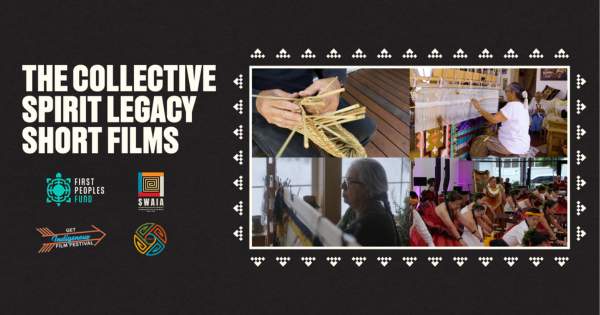
Native Artist Professional Development and Rolling Rez Arts Go Virtual
“A lot of the artists are expressing that they thought they were alone in this struggle, that they were the only ones having a hard time.”
—Leslie Deer (Muscogee), NAPD Trainer
When a cascade of canceled events started in March 2020, First Peoples Fund (FPF) heard directly from artists, community members, and relatives who shared their greatest needs, from income loss to lack of human connection.
In response, Hillary Presecan, FPF Program Manager of Community Development, reached out to Native Artist Professional Development (NAPD) trainers to discover what they felt was most critical to share through training.
“The NAPD trainers stepped up to a whole new level,” Hillary says. “Our trainers are part of our community, and they are artists to the core. It’s great that I’m able to say, ‘Tell me what you think people need. I want you to educate me on how we need to use our platform as an Indigenous organization.’”
Together with NAPD trainers already committed for the annual First Peoples Fund fellows convening and NAPD trainings across the country (all cancelled due to COVID), Hillary found ways to address the community’s needs. One of the challenges was shifting the NAPD curriculum to virtual training. Out of that developed the online “Resilience Webinar Series.”
Knowing it would be difficult for people to sit in front of a screen for eight hours straight, FPF chose drip feed training to break down the topics and allow people to get a taste of what the NAPD has to offer. One of those topics was “Planning the Artist Calendar,” drawn from the Marketing section of the manual.
Leslie Deer (Muscogee) — 2016 Artist in Business Leadership Fellow and NAPD trainer — led that session from the sewing studio in her home in Holdenville, Oklahoma.
“It’s important in these times to know how to plan for the future,” Leslie says. “[Continuing to learn] keeps people’s minds focused on what’s next. What can I be doing, or what opportunities are available? What are other artists doing? How is everyone coping? It is beneficial to network with others, and I think the Resilience Webinars Series is really, really important for artists.”
Hillary’s colleague, Rolling Rez Arts coordinator Bryan Parker (White Mountain Apache, Muscogee Creek, Mississippi Choctaw), knows it is critical to share inspiration. He launched “Saturday Art Live,” a vibrant, upbeat mix of performing and visual artists to bring a light of hope and inspiration to relatives around the world. The sessions include a 10-minute performing arts segment and an artist demonstration, offering both kinds of artists a platform to showcase their work.
“Before, the Rolling Rez Arts bus was limited on where we went, what community we provided resources to,” Bryan says. “Since everything was going virtual, my idea was to send the Rolling Rez out everywhere, virtually, and to utilize our fellows more with the program.”
2015 Artist in Business Leadership fellow Micheal Two Bulls (Oglala Lakota) got creative with his visual art session on printmaking, reimagining how he could share with a wide audience in a simplified way. He chose cyanotype printmaking as the most accessible for people, especially youth, to follow along as if they were at the bus, doing the project hands-on.
“You don’t need a lot of material, and what you need is relatively easy to find,” Micheal says. “It was great to have Bryan because while I was working, people would ask questions in the comments, and he would facilitate it. So it was a nice flow.”
The online interactions often continued with people private messaging or emailing each other. One thing viewers latched onto was that many of the artists were presenting from their studios.
It was the first time Micheal had opened his newer studio, located in his basement, to other artists.
“These times are hard, but there is some light,” Micheal says. “You get more access to artists with them streaming from their studios, talking through their processes.”
“It’s very relatable,” Bryan says. “When you see somebody else’s studio that may be set up similar to yours, it doesn’t make you feel as lost or helpless, in that you don’t have all the tools you want. You see somebody who’s making it work with what they have, and you think, ‘If they can do it with minimal resources, so can I.’”
“By sharing these cultural practices and cultural history, hopefully, we’ll be able to move forward in a more positive light,”
The Resilience Webinar Series, Saturday Art Live, and On the Virtual Road with Rolling Rez Arts, led by FPF artists and trainers, help meet the needs of artists, community members, and relatives with inspiration and training to keep them focused on what’s next.
“By sharing these cultural practices and cultural history, hopefully, we’ll be able to move forward in a more positive light,” Bryan says. “My whole idea with the video series is to inspire people, and to celebrate arts and culture.”










































































































